Related Research Articles

Triumph of the Will is a 1935 German Nazi propaganda film directed, produced, edited and co-written by Leni Riefenstahl. Adolf Hitler commissioned the film and served as an unofficial executive producer; his name appears in the opening titles. It chronicles the 1934 Nazi Party Congress in Nuremberg, which was attended by more than 700,000 Nazi supporters. The film contains excerpts of speeches given by Nazi leaders at the Congress, including Hitler, Rudolf Hess and Julius Streicher, interspersed with footage of massed Sturmabteilung (SA) and Schutzstaffel (SS) troops and public reaction. Its overriding theme is the return of Germany as a great power with Hitler as its leader. The film was produced after the Night of the Long Knives, and many formerly prominent SA members are absent.
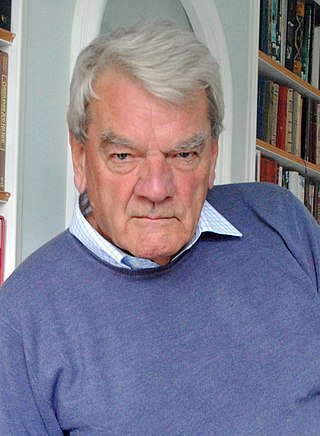
David John Cawdell Irving is an English author and Holocaust denier who has written on the military and political history of World War II, with a focus on Nazi Germany. His works include The Destruction of Dresden (1963), Hitler's War (1977), Churchill's War (1987) and Goebbels: Mastermind of the Third Reich (1996). In his works, he argued that Adolf Hitler did not know of the extermination of Jews, or, if he did, he opposed it. Though Irving's negationist claims and views of German war crimes in World War II were never taken seriously by mainstream historians, he was once recognised for his knowledge of Nazi Germany and his ability to unearth new historical documents.
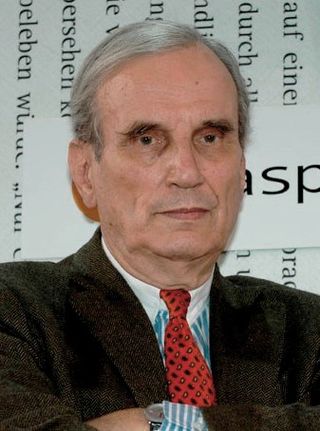
Joachim Clemens Fest was a German historian, journalist, critic and editor who was best known for his writings and public commentary on Nazi Germany, including a biography of Adolf Hitler and books about Albert Speer and German resistance to Nazism. He was a leading figure in the debate among German historians about the Nazi era. In recent years his writings have earned both praise and strong criticism.

The Kindertransport was an organised rescue effort of children from Nazi-controlled territory that took place in 1938–1939 during the nine months prior to the outbreak of the Second World War. The United Kingdom took in nearly 10,000 children, most of them Jewish, from Germany, Austria, Czechoslovakia, Poland, and the Free City of Danzig. The children were placed in British foster homes, hostels, schools, and farms. Often they were the only members of their families who survived the Holocaust. The programme was supported, publicised, and encouraged by the British government, which waived the visa immigration requirements that were not within the ability of the British Jewish community to fulfil. The British government placed no numerical limit on the programme; it was the start of the Second World War that brought it to an end, by which time about 10,000 kindertransport children had been brought to the country.

The Holocaust—the murder of about six million Jews by Nazi Germany from 1941 to 1945—is the best-documented genocide in history. Although there is no single document which lists all Jewish victims of Nazi persecution, there is conclusive evidence that about six million were murdered. There is also conclusive evidence that Jews were gassed at Auschwitz-Birkenau, the Operation Reinhard extermination camps, and in gas vans, and that there was a systematic plan by the Nazi leadership to murder them.
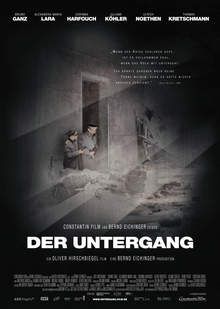
Downfall is a 2004 German-language historical war drama film directed by Oliver Hirschbiegel from a screenplay by its producer, Bernd Eichinger. It is set during the Battle of Berlin in World War II, when Nazi Germany is on the verge of defeat, and depicts the final days of Adolf Hitler. The cast includes Alexandra Maria Lara, Corinna Harfouch, Ulrich Matthes, Juliane Köhler, Heino Ferch, Christian Berkel, Alexander Held, Matthias Habich, and Thomas Kretschmann. The film is a German-Austrian-Italian co-production.

This is a selected bibliography and other resources for The Holocaust, including prominent primary sources, historical studies, notable survivor accounts and autobiographies, as well as other documentation and further hypotheses.
Laurence Rees is an English historian. He is a BAFTA winning historical documentary filmmaker and a British Book Award winning author of several books about Adolf Hitler, the Nazis and the atrocities committed, especially by them, during the 20th century. He is the former Head of BBC TV History Programmes.

Czesława Kwoka was a Polish Catholic girl who was murdered at the age of 14 in Auschwitz. One of the thousands of minor child and teen victims of German World War II war crimes against ethnic Poles in German-occupied Poland, she is among those memorialized in an Auschwitz-Birkenau State Museum exhibit, "Block no. 6: Exhibition: The Life of the Prisoners".

Hitler: A Film from Germany, called Our Hitler in the US, is a 1977 experimental biographical film written, directed and narrated by Hans-Jürgen Syberberg, and produced by Bernd Eichinger. An international co-production by West Germany, France and the United Kingdom, the film stars Heinz Schubert in a dual role, as Adolf Hitler and Heinrich Himmler. Along with Syberberg's characteristic and unusual motifs and style, it is also notable for its 442-minute running time.
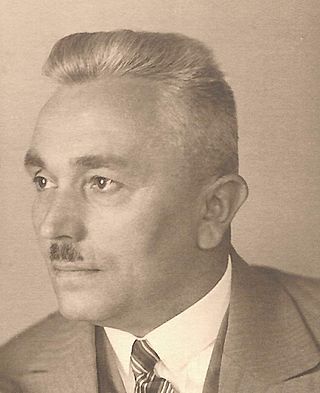
August Friedrich Kellner was a German mid-level official and diarist who worked as a justice inspector in Laubach from 1933 to 1945.
Hitler and the Occult, produced by Bram Roos and Phyllis Cannon, and narrated by actor David Ackroyd, is a 50-minute History Channel documentary regarding Nazi occultism.

Responsibility for the Holocaust is the subject of an ongoing historical debate that has spanned several decades. The debate about the origins of the Holocaust is known as functionalism versus intentionalism. Intentionalists such as Lucy Dawidowicz argue that Adolf Hitler planned the extermination of the Jewish people as early as 1918, and personally oversaw its execution. However, functionalists such as Raul Hilberg argue that the extermination plans evolved in stages, as a result of initiatives that were taken by bureaucrats in response to other policy failures. To a large degree, the debate has been settled by acknowledgement of both centralized planning and decentralized attitudes and choices.

The Architecture of Doom is a 1989 documentary by Swedish director Peter Cohen and narrated by Rolf Arsenius. German- and English-language versions have also been released.
Kirchenkampf is a German term which pertains to the situation of the Christian churches in Germany during the Nazi period (1933–1945). Sometimes used ambiguously, the term may refer to one or more of the following different "church struggles":
- The internal dispute within German Protestantism between the German Christians and the Confessing Church over control of the Protestant churches;
- The tensions between the Nazi regime and the Protestant church bodies; and
- The tensions between the Nazi regime and the Roman Catholic Church.
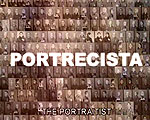
The Portraitist is a 2005 Polish television documentary film about the life and work of Wilhelm Brasse, the famous "photographer of Auschwitz", made for TVP1, Poland, which first aired in its "Proud to Present" series on January 1, 2006. It also premiered at the Polish Film Festival, at the West London Synagogue, in London, on March 19, 2007.

Nikolay Yakovlevich Kiselyov, also commonly transliterated from the Russian language as Nikolai Kiselev, was a Soviet Red Army commissar, prisoner of war, and partisan leader during World War II.
Nazism, the common name in English for National Socialism, is the far-right totalitarian political ideology and practices associated with Adolf Hitler and the Nazi Party (NSDAP) in Nazi Germany. During Hitler's rise to power in 1930s Europe, it was frequently referred to as Hitlerism. The later related term "neo-Nazism" is applied to other far-right groups with similar ideas which formed after the Second World War.
Hitler's Children is an Israeli-German 2011 documentary film directed by Chanoch Zeevi that portrays how relatives of Adolf Hitler's inner circle deal with the burden of that relationship and the identification of their surnames with the Holocaust. They describe the conflicted feelings of guilt and responsibility they carry with them in their daily lives and the disparate reactions of their siblings and other family members.
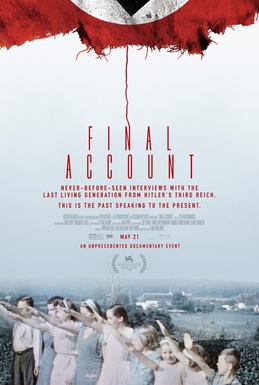
Final Account is a 2020 German-language documentary film directed and produced by Luke Holland, who died shortly after post-production was completed on June 10, 2020. The film follows the last living generation of German participants in Adolf Hitler's Third Reich.
References
- 1 2 3 4 5 6 7 "Luke Holland". U.K. Jewish Film. Retrieved 6 February 2023.
- ↑ "OPINION | REVIEW: 'Final Account' documents now-elderly Germans' memories of the Holocaust". Arkansas Online. 21 May 2021. Retrieved 5 February 2023.
- ↑ "Luke Holland's 'Final Account' is unsettling. That's why you need to watch it". The Forward. 13 May 2021. Retrieved 6 February 2023.
- 1 2 3 4 Fraser, Nick (5 July 2020). "Luke Holland obituary". The Guardian. ISSN 0261-3077 . Retrieved 8 February 2023.
- ↑ "Luke Holland". www.bafta.org. 17 July 2020. Retrieved 6 February 2023.
- 1 2 Alexander, Bryan. "Holocaust documentary 'Final Account' is the searing last mission for late director Luke Holland". USA TODAY. Retrieved 6 February 2023.
- ↑ "Good Morning Mr Hitler!". Paul Yule / Berwick Universal Pictures. Retrieved 6 February 2023.
- ↑ "Wollheim Memorial". www.wollheim-memorial.de. Retrieved 6 February 2023.
- ↑ "An English village caught on camera". The Argus. Retrieved 8 February 2023.
- ↑ "Luke Holland's Legacy: Recalling Final Account's Remarkable Journey". Focus Features. Retrieved 7 February 2023.
- ↑ ""A generation of Germans give final account of living through Nazi Germany"". National Public Radio. 22 May 2021.
- ↑ "An English village caught on camera". The Argus. Retrieved 8 February 2023.
- ↑ Holland, Luke, more than a life (2001) - Luke Holland | IDFA , retrieved 8 February 2023
- ↑ "Panda Awards". Wildscreen. Retrieved 9 February 2023.
- ↑ "Torres News (Thursday Island, Qld. : 1957-2015) - 6 Nov 1992 - p1". Trove. Retrieved 8 February 2023.
- ↑ "Corporate Assets" (PDF). Channel 4. Retrieved 8 February 2023.
- ↑ "Gene Hunters". tve. Retrieved 8 February 2023.
- ↑ "Flahertiana / A Very English Village: Going for the Kill". eng.flahertiana.ru. Retrieved 8 February 2023.
- ↑ "Eden". Cineuropa - the best of european cinema. Retrieved 7 February 2023.
- ↑ "A Very English Village: Going for the Kill / BBC Storyville / Official Programme / Programme / 2006 / ZAGREBDOX International documentary film festival". zagrebdox.net. Retrieved 7 February 2023.
- ↑ "Final Account – Exclusive Season". www.classiccinemas.com.au. Retrieved 8 February 2023.